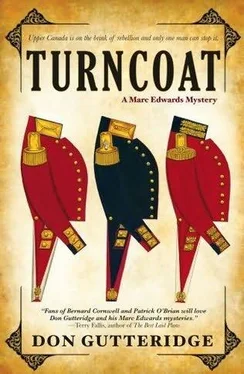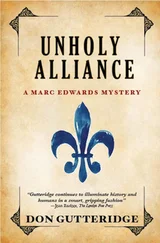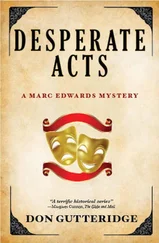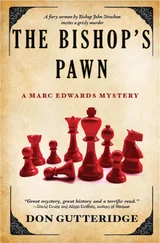Don Gutteridge - Turncoat
Здесь есть возможность читать онлайн «Don Gutteridge - Turncoat» весь текст электронной книги совершенно бесплатно (целиком полную версию без сокращений). В некоторых случаях можно слушать аудио, скачать через торрент в формате fb2 и присутствует краткое содержание. Год выпуска: 2003, Издательство: Simon & Schuster, Жанр: Исторический детектив, на английском языке. Описание произведения, (предисловие) а так же отзывы посетителей доступны на портале библиотеки ЛибКат.
- Название:Turncoat
- Автор:
- Издательство:Simon & Schuster
- Жанр:
- Год:2003
- ISBN:нет данных
- Рейтинг книги:4 / 5. Голосов: 1
-
Избранное:Добавить в избранное
- Отзывы:
-
Ваша оценка:
- 80
- 1
- 2
- 3
- 4
- 5
Turncoat: краткое содержание, описание и аннотация
Предлагаем к чтению аннотацию, описание, краткое содержание или предисловие (зависит от того, что написал сам автор книги «Turncoat»). Если вы не нашли необходимую информацию о книге — напишите в комментариях, мы постараемся отыскать её.
Turncoat — читать онлайн бесплатно полную книгу (весь текст) целиком
Ниже представлен текст книги, разбитый по страницам. Система сохранения места последней прочитанной страницы, позволяет с удобством читать онлайн бесплатно книгу «Turncoat», без необходимости каждый раз заново искать на чём Вы остановились. Поставьте закладку, и сможете в любой момент перейти на страницу, на которой закончили чтение.
Интервал:
Закладка:
He changed to the subject raised by his fellow legislator, Peter Perry: the fate of the Seventh Report on Grievances. One by one, and in a voice now more terrible for its calculated restraint, he touched on the particular wounds that festered and burned amongst them: the Clergy Reserves, the ruinous lending policies of the Bank of Upper Canada, the rejection by the appointed Legislative Council of bill after bill that would alleviate their suffering, the graft and bumbling of the Welland Canal Company, the low prices of grain manipulated for the benefit of the mother country and its coddled emissaries here among the ruling clique, the greed and venality of district magistrates more arrogant than English squires or the absentee landlords of Scotland and Ireland.
A chant now rose up from the throng, softening whenever Mackenzie hammered home a point and swelling to occupy even the briefest pause: “No more! No more! No more!”
The rage had become contagious. The parishioners were slowly metamorphosing into a mob, with a mob’s unreasoned and overfocused hate, its craving for a scapegoat. Suddenly Marc realized that this kind of collective outrage was potent enough to propel one of its participants to murder, to a sort of political execution whose sole purpose might be release for pent-up anger. The choice of victim could be arbitrary, as long as he represented the party of oppression. Even someone like Joshua Smallman might well do, particularly if he were behaving like a paid agent of the enemy.
Mackenzie had not quite finished. Having stirred their passions and gained their full attention, he began explaining to them, in moderated tones and with didactic earnestness, the importance of their recent success in getting the Report on Grievances a fair hearing in the British cabinet, of their unequivocal victory in the alien question, of their current control of the Assembly and its bills of supply, and, no mean feat, of the Family Compact’s acute embarrassment over the abrupt reassignment of the meddling John Colborne. Indeed, a new governor-a man with no military experience to hobble him, a man of letters who penned travel books and poems-was en route from Montreal to Toronto at this very moment. Now was not the time for precipitate or thoughtless action. The recent and sterling example provided by Jacksonian democracy in the republic to the south proved that, with patience and unceasing pressure and petition, the voice of the people even in remote regions would be heard and would prevail.
A reverent hush once again gripped the faithful. Hope, however feeble, had been resuscitated.
“What about my rights?” The voice from the crowd was a high-pitched, irreverent cackle.
Mackenzie halted in mid clause. Instantly his gaze fixed the woman twenty feet from him who had spoken. He smiled and, with a twinkle in his eye, said, “And what rights have we not yet addressed, madam?”
Heads craned and feet shuffled.
“I wanta know when the land I’ve been squattin’ on fer twenty-five years is gonna be deeded to me and my young’uns.”
“But squatters’ rights have always been protected, ma’am-unless you’re perched upon a bishop’s birthright!”
The crowd roared its approval of this quip, but not before one phrase tittered through it, lip to lip: “It’s Mad Annie!”
From his position Marc could see the portly sheriff trying to force his bulk across the room towards the citizen of his county he admired the least.
“Then why won’t the arsehole callin’ himself our magistrate assign me the deed?”
“Have you improved the property according to regulations?” Mackenzie said patiently to Mad Annie over the derisory howls of the men around her.
“If plantin’ whisky trees and harvestin’ a bastard a year are improvements, you shoulda had that piece of swamp years ago!” a neighbourly wag suggested.
“You shut yer fuckin’ face, Hislop!”
“Madam, there are ladies in the hall-”
“Fuck the ladies! I want my rights! What kinda dickless wonder are you anyways?”
The sheriff and a brace of constables were closing in.
“We got trouble outside,” Hatch said to Marc, drawing him through the side door and away from the low comedy. At least Mad Annie had redirected the crowd’s attention, and, with Mackenzie’s own unexpected shift at the end of his speech, Marc felt certain that the evening would conclude without a riot.
“Behind the privies,” Hatch said, hurrying towards an opening in the trees to the right of the outhouses. “Young Farley spilled the beans to me inside.”
Marc followed Hatch, and the two soon emerged into the clearing behind the privies. A few yards farther into the bush, they heard a commotion: low cursing, hissed commands, and a clatter of wood and crockery.
“Damn!” Hatch cried. “Somebody’s tipped them off!”
By the time he and Marc reached the scene of the crime, Mad Annie’s enterprising progeny had scurried into the trees, lugging their paraphernalia with them. Pursuit was unthinkable.
“Well, I suppose the sheriff will appreciate us confiscating what’s left.” Hatch chuckled as he held up one of the dozen or so clay jugs that remained unbroken.
They walked back to the privies, noting a well-trodden path between the improvised outdoor shebeen and one of the toilets. “How in blazes did they get the rotgut to the customer?” Hatch mused aloud.
“This way,” Marc said. He was pointing to a Dutch door cut into the upper half of the back wall of the middle privy. “Not everyone came here to do his business.”
“Jesus,” Hatch said, “and I bet the ruckus Mad Annie created in there was a diversion while her lads dismantled the operation and hightailed it home.”
Hatch went back into the hall through the side door, but Marc decided to go around to the front door for a final check. He remembered that the shorter constable had left his post there to assist the sheriff in his pincer movement against Mad Annie. The uproar inside appeared to have escalated a decibel or two, and Marc hoped the crowd had not begun to view the hapless Annie Pringle as its scapegoat. As far as he could tell, the pile of potential weapons had not been reduced. Six or seven of the women had wisely come outside (Beth was not among them), and several were standing on alert beside their family sleighs. The Reform rally was nearing its end.
Marc stepped through the double doors-into bedlam.
“I’m gettin’ the ladies out!” Durfee shouted at him. “Try to get to the platform if you can!”
In front of him Marc could see only a seething tangle of arms, legs, and contorted faces, the arms ending with fists, and not a few of them wielding stout sticks or cricket bats. As the weapons came crashing down, the thud and crack of wood upon clothed bone or vulnerable skull reverberated above the cries, curses, and howls of pain. A full-scale donnybrook was in progress. But who was fighting whom? And where had the weapons come from?
Marc plunged in. A berserk fellow was indiscriminately swinging a hobnailed stick at a group of farmers in desperate, jumbled retreat.
“We’re gonna bust the heads of every one of you republican arseholes!” the attacker screamed, and he lashed out, striking one of his victims on the shoulder and knocking him sideways. Marc leaped ahead and put both hands on the stick before it could be raised again, ripped it out of the lunatic’s grip, and clipped him on the jaw. He dropped in his tracks.
The victim groaned. It was Angus Farley, one of the American immigrants Marc had visited late Thursday afternoon. “Who are these hooligans?” he said, helping Farley to his feet.
“Orangemen from Toronto,” Farley rasped. His left arm was hanging limply at his side. “We gotta get to the platform. It’s Mackenzie they’re after!”
Читать дальшеИнтервал:
Закладка:
Похожие книги на «Turncoat»
Представляем Вашему вниманию похожие книги на «Turncoat» списком для выбора. Мы отобрали схожую по названию и смыслу литературу в надежде предоставить читателям больше вариантов отыскать новые, интересные, ещё непрочитанные произведения.
Обсуждение, отзывы о книге «Turncoat» и просто собственные мнения читателей. Оставьте ваши комментарии, напишите, что Вы думаете о произведении, его смысле или главных героях. Укажите что конкретно понравилось, а что нет, и почему Вы так считаете.












